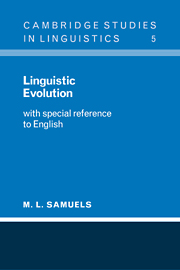Book contents
- Frontmatter
- Contents
- Preface
- Note to second impression
- Abbreviations
- 1 Introduction
- 2 Variation in the spoken chain
- 3 System: the phoneme
- 4 Grammar and lexis (I): variation
- 5 Grammar and lexis (II): systemic regulation
- 6 Diversity and contact
- 7 An assessment of the problem
- 8 Dimensions of study
- 9 Conclusions
- Bibliography
- Index of persons
- Index of subjects
- Plate section
- Frontmatter
- Contents
- Preface
- Note to second impression
- Abbreviations
- 1 Introduction
- 2 Variation in the spoken chain
- 3 System: the phoneme
- 4 Grammar and lexis (I): variation
- 5 Grammar and lexis (II): systemic regulation
- 6 Diversity and contact
- 7 An assessment of the problem
- 8 Dimensions of study
- 9 Conclusions
- Bibliography
- Index of persons
- Index of subjects
- Plate section
Summary
Change and evolution
The title of this book (‘Linguistic Evolution’) was chosen in preference to ‘Linguistic Change’ although it is about linguistic change. That is because its purpose is to attempt an examination of the large complex of different factors involved, and the title ‘Linguistic Change’ might have entailed an oversimplification. Nevertheless ‘evolution’ is itself open to the misunderstanding that some sort of progress is implied, that a clearer or more effective means of communication has been achieved as a result of it. That meaning of ‘evolution’ is not intended here. We are not concerned here with the prehistoric origins of human language, and, as has often been pointed out, there is today no such thing as a ‘primitive’ language; every language is of approximately equal value for the purposes for which it has evolved, whether it belongs to an advanced or a primitive culture. For English, this can be shown, among other ways, by the fact that in earlier stages certain grammatical distinctions could be made that can no longer be made today (see 4.1 below).
In what sense, then, can a language be said to ‘evolve’? We must recognise, firstly, that there is no inevitable one-for-one correspondence between a language and the culture it serves, and that the language need not be a precise mirror of the culture as it exists at any given time. Indeed, the so-called Whorfian hypothesis leaves open the possibility that an individual language, so far from merely accommodating or mirroring a culture's channels of thought, may to some extent even guide and control them, and so, no doubt, in many minor ways, it does.
- Type
- Chapter
- Information
- Linguistic EvolutionWith Special Reference to English, pp. 1 - 8Publisher: Cambridge University PressPrint publication year: 1972



